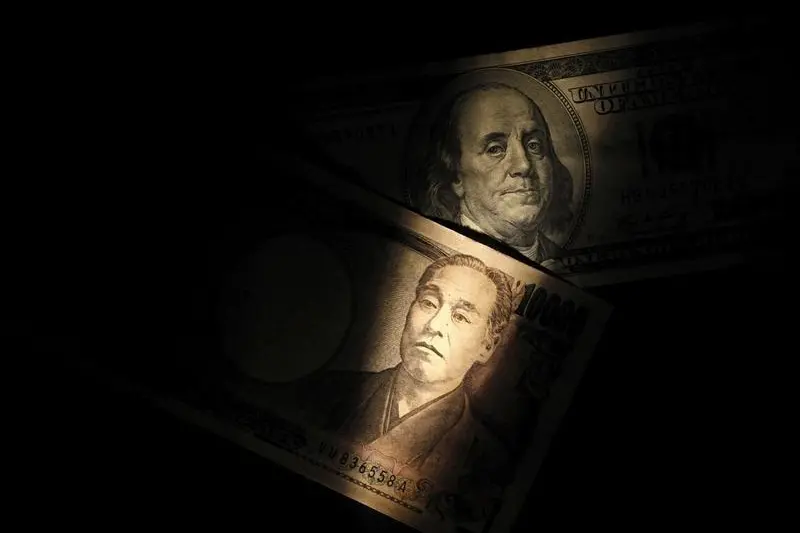PHOTO
* Finance minister says Japan ready to intervene if needed
* Dollar extends last week's gains against yen
* Aussie falls after weak China trade data
By Jemima Kelly
LONDON, May 9 (Reuters) - The dollar hit a ten-day high against the yen on Monday after Japan's finance minister said Tokyo was ready to intervene in the market if currency moves were volatile enough to hurt the country's trade and economy.
The dollar hit a 18-month low against the yen last week
JPY=
, having lost 13 percent against the Japanese currency in the past six months amid market turbulence and as investor expectations for a steady increase in U.S. interest rates have failed to materialise.
That has prompted a ramping-up of intervention talk from Japan, with Finance Minister Taro Aso's comments on Monday following remarks last week from Prime Minister Shinzo Abe, who said it was watching the yen's movements and would act if necessary.
urn:newsml:reuters.com:*:nT9N179018
urn:newsml:reuters.com:*:nB4N12S02M
Many investors, though, believe the bar for intervention is still high, and that U.S. officials are not comfortable with more dollar gains.
A recent U.S. Treasury report said "persistent one-sided" intervention by countries to weaken their currencies could see countries with big trade surpluses, such as Japan, classified as manipulators.
The dollar index, which measures its value against a basket of six major currencies, edged up 0.1 percent on Monday to an 11-day high of 94.056
.DXY
, having shown a fairly muted reaction to Friday's mixed U.S. jobs report. That left it well clear of a 16-month trough of 91.919 hit last week.
"The labour market report didn't have a very lasting impact, and I think that's because markets have pretty much priced out another rate hike, in June certainly, and even this year it's becoming more questionable," said Commerzbank currency strategist Thulan Nguyen, in Frankfurt.
"There is little to suggest that we will see further dollar strength from this point on. We've had a little recovery... but I think this is as far as we can go for the time being."
Also helping the dollar's slight rebound was New York Federal Reserve President William Dudley, who said two U.S. rate hikes this year remained a "reasonable expectation".
urn:newsml:reuters.com:*:nL2N1831I4
Speculators increased bets against the dollar in the week up to last Tuesday, taking the most net dollar short bets since Feb. 5, 2013.
IMM/FX
Any respite for the dollar would prove short lived, said Satoshi Okagawa, senior global markets analyst for Sumitomo Mitsui Banking Corporation in Singapore.
"In the end, the market will probably try to push the dollar lower as the prospects for U.S. interest rate rises move further out, almost like a mirage," Okagawa said.
Disappointing trade figures from China on Sunday led the Australian dollar, often used as a liquid proxy for China plays, down half a percent to a 10-week low of $0.7335
AUD=D4
urn:newsml:reuters.com:*:nL3N1821WI
(Additional reporting by Ian Chua in Sydney and Masayuki Kitano in Singapore; editing by John Stonestreet) ((jemima.kelly@thomsonreuters.com)(+44)(0)(20 7542 7508)(Reuters Messaging: jemima.kelly.thomsonreuters@reuters.net))
* Dollar extends last week's gains against yen
* Aussie falls after weak China trade data
By Jemima Kelly
LONDON, May 9 (Reuters) - The dollar hit a ten-day high against the yen on Monday after Japan's finance minister said Tokyo was ready to intervene in the market if currency moves were volatile enough to hurt the country's trade and economy.
The dollar hit a 18-month low against the yen last week
That has prompted a ramping-up of intervention talk from Japan, with Finance Minister Taro Aso's comments on Monday following remarks last week from Prime Minister Shinzo Abe, who said it was watching the yen's movements and would act if necessary.
Many investors, though, believe the bar for intervention is still high, and that U.S. officials are not comfortable with more dollar gains.
A recent U.S. Treasury report said "persistent one-sided" intervention by countries to weaken their currencies could see countries with big trade surpluses, such as Japan, classified as manipulators.
The dollar index, which measures its value against a basket of six major currencies, edged up 0.1 percent on Monday to an 11-day high of 94.056
"The labour market report didn't have a very lasting impact, and I think that's because markets have pretty much priced out another rate hike, in June certainly, and even this year it's becoming more questionable," said Commerzbank currency strategist Thulan Nguyen, in Frankfurt.
"There is little to suggest that we will see further dollar strength from this point on. We've had a little recovery... but I think this is as far as we can go for the time being."
Also helping the dollar's slight rebound was New York Federal Reserve President William Dudley, who said two U.S. rate hikes this year remained a "reasonable expectation".
Speculators increased bets against the dollar in the week up to last Tuesday, taking the most net dollar short bets since Feb. 5, 2013.
Any respite for the dollar would prove short lived, said Satoshi Okagawa, senior global markets analyst for Sumitomo Mitsui Banking Corporation in Singapore.
"In the end, the market will probably try to push the dollar lower as the prospects for U.S. interest rate rises move further out, almost like a mirage," Okagawa said.
Disappointing trade figures from China on Sunday led the Australian dollar, often used as a liquid proxy for China plays, down half a percent to a 10-week low of $0.7335
(Additional reporting by Ian Chua in Sydney and Masayuki Kitano in Singapore; editing by John Stonestreet) ((jemima.kelly@thomsonreuters.com)(+44)(0)(20 7542 7508)(Reuters Messaging: jemima.kelly.thomsonreuters@reuters.net))





















